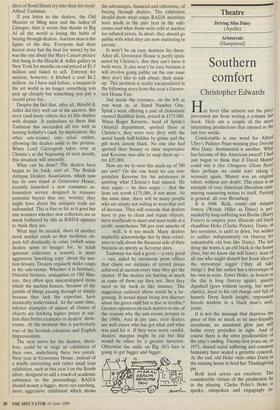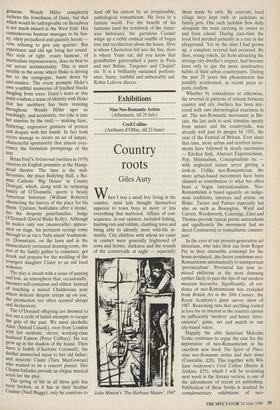Theatre
Driving Miss Daisy (Apollo) Aristocrats (Hampstead)
Southern comfort
Christopher Edwards
Hay fever (the ailment not the play) prevented me from writing a column last week. Here are a couple of the more interesting productions that opened in the last two weeks.
Comfortable is one word for Alfred Uhry's Pulitzer Prize-winning play Driving Miss Daisy. Sentimental is another. What has become of this American award? I had just begun to think that if David Mamet could win it (for Glengarry Glenn Ross) then perhaps we could start taking it seriously again. Mamet was an original talent, without any doubt. This piece is an example of cosy American liberalism mur- muring reassuring noises to itself. Purring is general, all over Broadway. It is 1948. Rich, crusty old Atlanta Jewess (Wendy Hiller as Daisy) is per- suaded by long-suffering son Boolie (Barry Foster) to employ poor illiterate old black chauffeur Hoke (Clarke Peters). Daisy, in her seventies, is unfit to drive, but wishes to soldier independently on (hurray for indomitable old bats like Daisy). The last thing she wants is an old black in the house (boo, but we know she will learn), least of all one who might disturb her frank idea of the stereotype nigger (`they all take things'). But the author has a stereotype of his own in store. Enter Hoke, as honest as the day is long (hurray again), quietly dignified (goes without saying, but more cheers), loyal to his old charge and full of homely Deep South insight; oppression breeds wisdom in a black man's soul, yessir.
It is not the message that deprives the piece of bite so much as its user-friendly serrations; an autumnal glow just will bathe every prejudice in sight. And of course there is the utter predictability of the play's ending. Twenty-five years on, in 1973, shared racial suffering and common humanity have sealed a geriatric concord. At the end, old Hoke visits older Daisy in the nursing home to feed her Thanksgiving pie. Both lead actors are excellent. The considerable virtues of the production lie in the playing. Clarke Peter's Hoke is sparky, outspoken and engagingly in- genuous. Wendy Hiller completely eschews the Jewishness of Daisy, but that which would be unforgivable on Broadway is not much missed in the West End. Her cantankerous hauteur manages to be fun- ny, vilely prejudiced and quaintly heroic virtu refusing to give any quarter. But experience and old age bring her round. Her style of tight, crusty humour, of Inarticulate expressiveness, does its best to Cut across sentimentality. This is most notable in the scene where Hoke is driving her to the synagogue, burnt down by anti-semites. The event prompts Hoke's own youthful memories of lynched blacks dangling from trees. Daisy's tears at this Point confirm a sense of identity with Hoke that her snobbery has been resisting throughout. Wendy Hiller ages so touchingly, and accurately, too (she is into her nineties by the end) — making faint, fluttering, expressive gestures of protest and despair with her hands. In fact both actors manage to create an air of simple, characterful spontaneity that almost over- comes the formulaic promptings of the text.
Brian Friel's Aristocrats (written in 1979) receives its English premiere at the Hamp- stead theatre. The time is the mid- Seventies, the place Ballybeg Hall, a Ro- man Catholic 'Big House' in County Donegal, which, along with its returning family of O'Donnells, sports a beady American historian (William Roberts) chronicling the history of the place for his thesis. Upstairs, bedridden after a stroke, lies the despotic paterfamilias, Judge O'Donnell (David Blake Kelly). Although he makes only one (memorable) appear- ance on stage, his pertinent ravings come through to us via a 'baby alarm' loudspeak- er. Downstairs, on the lawn and in the immaculately recreated drawing-room, the rest of the family gather to reminisce, get drunk and prepare for the wedding of the youngest daughter Claire to an old local widower.
The play is awash with a sense of passing and loss, an atmosphere that, occasionally, becomes self-conscious and stilted. Instead of touching a muted Chekhovian note where delicate despair creeps up on you, the production too often seemed abrupt and declaratory. The O'Donnell offspring are doomed to live out a cycle of failed attempts to escape the grip of the past. We meet alcoholic Alice (Sinead Cusack), over from London with her sardonic, clever, working-class husband Eamon (Peter Coffrey). He too grew up in the shadow of the house. Then there is Judith (Charlotte Cornwell), the dutiful unmarried nurse to her old father; and neurotic Claire (Tara MacGowran) who wanted to be a concert pianist. Her Chopin ballades provide an elegiac musical score for the play. The spring of life in all three girls has been broken, as it has in their brother Casimir (Niall Buggy), only he contrives to fend off his sorrow by an irrepressible, pathological romanticism. He lives in a fantasy world. For the benefit of his fantasies (and the notebook of the Amer- ican historian), the garrulous Casimir whips up a richly comical souffle of bogus lore and recollection about the house. Here is where Chesterton fell into the fire, there is where Yeats sat; did you know that grandfather gatecrashed a party in Paris and met Balzac, Turgenev and Chopin? etc. It is a brilliantly sustained perform- ance, funny, truthful and unbearably sad. Robin Lefevre directs.



















































 Previous page
Previous page